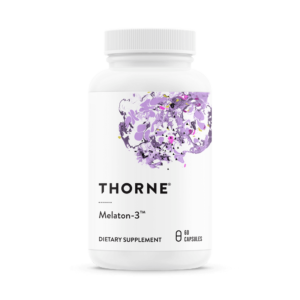Melaton-3
We Prefer This Brand Because...
This formula, Melaton-3, is well-absorbed and long-acting; we've seen many patients gain deeper, more sustained sleep that lasts for up to 8 hours which is longer than with other melatonin formulations we'd tried. We don't generally recommend rapid-acting or sublingual pills that tend to wear off during the night. This formula has a non-allergenic base of leucine, an amino acid, which helps with steady, even absorption. For many of our patients, it reduces the frequency of waking during the night and shortens the duration of time awake.
About About Melatonin
Melatonin is a neuro-hormone made by the pea-sized pineal gland located at the base of the brain from the amino acids, tryptophan and serotonin. The ancient Greeks viewed the pineal gland as the seat of the soul; now it seems its only function is melatonin production. Melatonin release surges with darkness; blood levels naturally peak about an hour before natural bedtime, and it is suppressed by light. Melatonin acts on MT-melatonin receptors in the hypothalamus, the site of the body’s master circadian clock, to regulate sleep-wake cycles and circadian rhythm which synchronizes adrenal activity and the secretion of many other hormones as well as the rhythm of blood pressure regulation, ovarian physiology, and immune function.
For initiation insomnia, which is difficulty falling asleep, or delayed sleep phase syndrome (DSPS), melatonin is particularly effective when natural melatonin levels are low, which is common especially in older people. Melatonin can also improve measures of quality of life such as mood, vitality, and bodily pain in young adults with DSPS. Melatonin is indicated for disruptions of the sleep-wake cycle, including jet lag. Studies show that it is most effective when taken on the nights of travel rather than being started days ahead. Melatonin can help disturbed sleep-wake cycles in children and adolescents with intellectual disabilities, autism, and other central nervous system disorders; it reduces sleep interruptions in elderly people with dementia; and it may improve sleep quality in people with reduced rapid-eye movement (REM) sleep or chronic pain. Melatonin works partly by enhancing the effects of gamma-amino butyric acid (GABA), a calming neurotransmitter. For insomnia we recommend that patients start at 3 mg at bedtime and if that is not enough, we occasionally recommend 6 mg. If taken before surgery, research has shown that melatonin decreases the amount of anesthesia required during surgery.
For bone density, melatonin is a new and exciting addition. A June 2010 study showed bone density improvements after only six months on melatonin. A 2013 report in the International Journal of Molecular Science summed up melatonin's important roles in enhancing the mineral density of bones and teeth. Subsequent research shows that melatonin may have notable anti-aging effects on bones and help prevent or even reverse osteoporosis: encouraging better bone volume, better density, and fewer fractures. This may partly be from better rest because the cells that break down bone (osteoclasts) are more active when sleep quality is poor.
Melatonin also directly affects bone metabolism in three ways. Firstly, numerous studies have documented that melatonin increases pre-osteoblast and osteoblast cells that build new bone. It boosts indicators of new bone development like collagen and bone marker proteins alkaline phosphatase, osteopontin and osteocalcin, as well as stimulates more laying down of calcium, magnesium, and minerals. Secondly, melatonin encourages systemic hormones such as PTH, calcitonin, and estrogen which naturally augment bone building. Thirdly, osteoclasts generate free radicals and superoxide anions during bone breakdown that further damage bones: melatonin is an antioxidant which can clear up the free radicals so that bones can repair more easily.
Low melatonin may be linked with osteoporosis: nocturnal plasma melatonin levels decline with age, and melatonin secretion decreases sharply during menopause when osteoporosis often begins. Studies are showing that melatonin for perimenopausal women can increase bone thickness in the vertebrae and femur, reduce the bone loss marker NTx, and reduce cartilage breakdown.
Melatonin is low in women with PMS and especially women with premenstrual dysphoric disorder (PMDD) which comprises of depression, tension, and irritability 1-2 weeks before periods. Research found that women with PMDD have lower night time melatonin levels in general, and these drop even further in the premenstrual week. Melatonin appears to be potentially helpful, with depressed feelings and premenstrual insomnia.
Contents
1 capsule provides:
Melatonin 3 mg
Other Ingredients: Microcrystalline Cellulose, Hypromellose (derived from cellulose) capsule, Calcium Laurate, Silicon Dioxide
This product does not contain artificial coloring, artificial flavoring, ingredients of animal origin, dairy, gluten or soy.
Cautions
Always take natural remedies under the supervision of your health care provider. Do not use melatonin without the advice of your healthcare professional if you take medicine for insomnia. Use melatonin with caution, as its relaxant effect may cause sedation or alteration of circadian rhythm.
Do not take melatonin if you take medication for diabetes, or cancer treatment which can be magnified with melatonin. Use with caution if you take natural remedies for anxiety or insomnia, such as 5-HTP, hops, Jamaican dogwood, kava, skullcap, or valerian. Take with caution and only with a medical professional's advice if you also use vitamin B-12 which can boost the body's natural melatonin levels.
Do not use during pregnancy or lactation unless under the guidance of your physician as there is insufficient data about safety during pregnancy.

60 capsules
Benefits of Consistency
“With the right vitamins, herbs and foods, your health can continue to improve over time, as vibrant new tissues replace old cells. Our patients often feel increasing vitality as medical tests get better and better, year after year.”
- Dr. Rachelle Herdman







